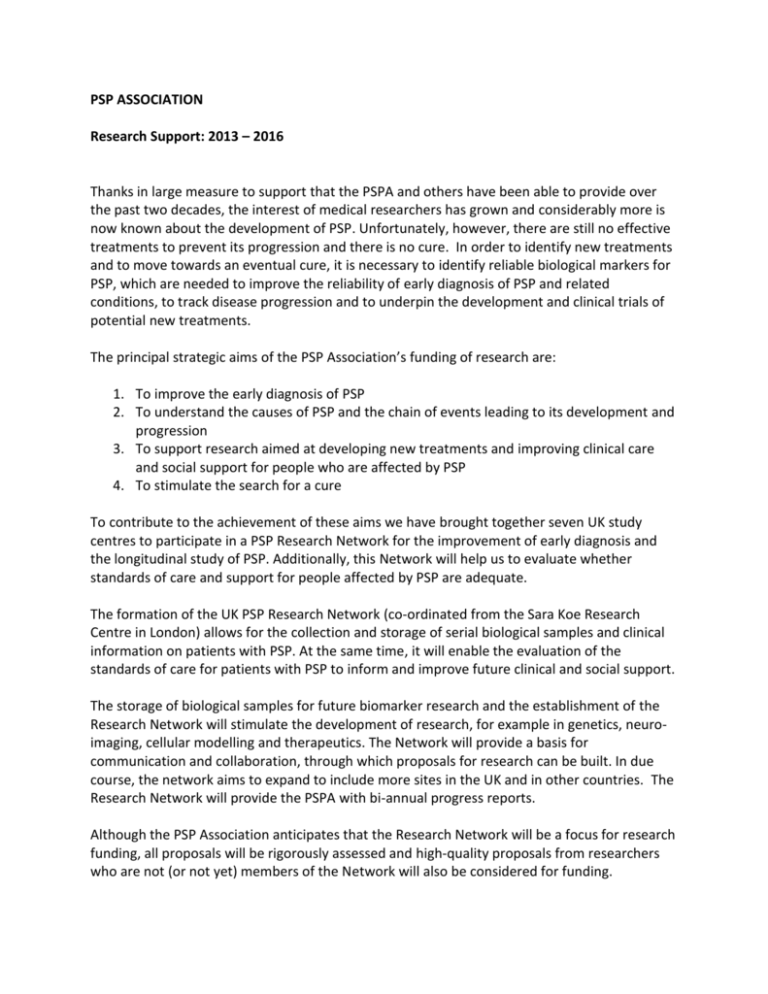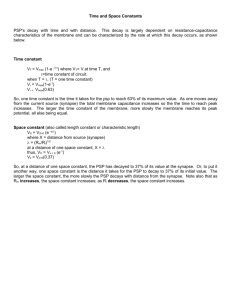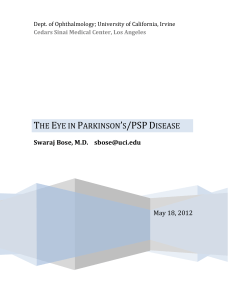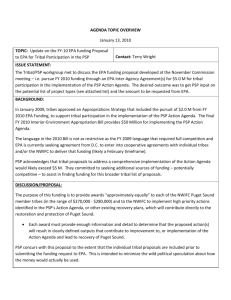PSP ASSOCIATION Research Support: 2013 – 2016 Thanks in
advertisement

PSP ASSOCIATION Research Support: 2013 – 2016 Thanks in large measure to support that the PSPA and others have been able to provide over the past two decades, the interest of medical researchers has grown and considerably more is now known about the development of PSP. Unfortunately, however, there are still no effective treatments to prevent its progression and there is no cure. In order to identify new treatments and to move towards an eventual cure, it is necessary to identify reliable biological markers for PSP, which are needed to improve the reliability of early diagnosis of PSP and related conditions, to track disease progression and to underpin the development and clinical trials of potential new treatments. The principal strategic aims of the PSP Association’s funding of research are: 1. To improve the early diagnosis of PSP 2. To understand the causes of PSP and the chain of events leading to its development and progression 3. To support research aimed at developing new treatments and improving clinical care and social support for people who are affected by PSP 4. To stimulate the search for a cure To contribute to the achievement of these aims we have brought together seven UK study centres to participate in a PSP Research Network for the improvement of early diagnosis and the longitudinal study of PSP. Additionally, this Network will help us to evaluate whether standards of care and support for people affected by PSP are adequate. The formation of the UK PSP Research Network (co-ordinated from the Sara Koe Research Centre in London) allows for the collection and storage of serial biological samples and clinical information on patients with PSP. At the same time, it will enable the evaluation of the standards of care for patients with PSP to inform and improve future clinical and social support. The storage of biological samples for future biomarker research and the establishment of the Research Network will stimulate the development of research, for example in genetics, neuroimaging, cellular modelling and therapeutics. The Network will provide a basis for communication and collaboration, through which proposals for research can be built. In due course, the network aims to expand to include more sites in the UK and in other countries. The Research Network will provide the PSPA with bi-annual progress reports. Although the PSP Association anticipates that the Research Network will be a focus for research funding, all proposals will be rigorously assessed and high-quality proposals from researchers who are not (or not yet) members of the Network will also be considered for funding. The success of research can never be guaranteed, but our expectation is that research supported by the PSP Association will lead to improvement in early diagnosis of PSP and related conditions, validation of clinical rating scales used for PSP, evaluation of the role of genetic variation in the development of PSP and new approaches to treatment. Specific areas of investigation might include: Follow-up and replication of genome wide association studies aimed at identifying genetic factors in the aetiology of PSP Whole exome sequencing in PSP, to enable identification of new genetic variants Establishment of cerebrospinal fluid, plasma and serum biomarkers for PSP Evaluation of the NINDS-SPSP diagnostic criteria and early disease features in the light of autopsy follow-up Development of diagnostic criteria for PSP-Parkinsonism, and further PSP clinical subtypes. Development of diagnostic criteria for CBS sub-types Development of longitudinal scales for the assessment of CBS Evaluation and development of diagnostic and longitudinal neuro-imaging studies Evaluation and development of diagnostic and longitudinal neuro-psychological studies Development of PSP disease modelling using skin biopsies, fibroblast culture and development of induced pluripotent stem cells The PSPA has already announced a call for proposals but it is expected (and hoped) that demand will far exceed funds available. Indeed, some investigations are likely to be of a scale that could not be funded by the PSPA alone. The PSPA is, then, keen to develop funding partnerships, which are likely to give benefits beyond the sharing of research costs. Possible funding partners include CURE-PSP, CBD Solutions, the Medical Research Council, the National Institute for Health Research, the Wellcome Trust and other research-interested Trust Funds. External advertising is not recommended. Applications to the PSPA will be assessed as follows: 1. Each application will be reviewed by a minimum of three independent referees. Where practicable, these referees will be from outside the UK. 2. Full applications and referees’ reports will be graded by a separate committee, chaired by Professor Dame Pam Shaw. 3. Funding recommendations will be presented to PSPA Trustees for decision. 4. Successful applicants will subsequently be invited to present to the Board of Trustees. Successful applicants will be required to submit annual reports to the PSPA and to disseminate the results of their work expeditiously, and preferably through open-access publication. The PSPA is strongly in favour of the deposition of original data in open-access repositories, where available, and the sharing of data and other outcomes of research with other researchers. Retrospective evaluation of research will be carried out with reference to publication and citation records, and by assessing research impact in a number of “payback categories” such as Knowledge Production, Capacity Building, Policy and Product Development, Health and Health Sector Benefits, and Broader Economic Benefit.




